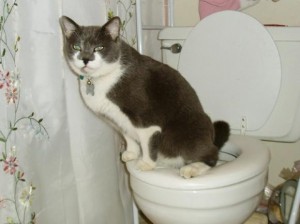Why You Should Never Flush Cat Poop Down Your Toilet - Important Information
Why You Should Never Flush Cat Poop Down Your Toilet - Important Information
Blog Article
Each person is bound to have his or her own way of thinking in relation to Can You Flush Cat Poo or Litter Down the Toilet?.

Introduction
As feline proprietors, it's vital to bear in mind exactly how we deal with our feline good friends' waste. While it might appear hassle-free to purge feline poop down the bathroom, this method can have damaging repercussions for both the environment and human health.
Alternatives to Flushing
Fortunately, there are more secure and extra accountable ways to deal with pet cat poop. Think about the complying with choices:
1. Scoop and Dispose in Trash
One of the most common approach of throwing away cat poop is to scoop it right into a biodegradable bag and toss it in the trash. Make sure to make use of a dedicated litter scoop and deal with the waste quickly.
2. Use Biodegradable Litter
Opt for biodegradable pet cat clutter made from products such as corn or wheat. These trashes are environmentally friendly and can be safely disposed of in the garbage.
3. Hide in the Yard
If you have a yard, consider hiding feline waste in a designated location away from vegetable yards and water sources. Make certain to dig deep sufficient to prevent contamination of groundwater.
4. Mount a Pet Waste Disposal System
Purchase a pet waste disposal system especially created for cat waste. These systems utilize enzymes to break down the waste, reducing odor and ecological impact.
Wellness Risks
In addition to environmental problems, flushing feline waste can additionally present wellness risks to people. Pet cat feces might contain Toxoplasma gondii, a parasite that can create toxoplasmosis-- a possibly serious ailment, particularly for pregnant ladies and people with damaged body immune systems.
Ecological Impact
Flushing cat poop introduces unsafe pathogens and bloodsuckers right into the water supply, presenting a significant risk to water ecological communities. These contaminants can negatively affect aquatic life and concession water top quality.
Verdict
Responsible pet ownership extends beyond offering food and shelter-- it also involves appropriate waste administration. By refraining from flushing feline poop down the toilet and choosing alternate disposal techniques, we can reduce our environmental footprint and protect human health.
Why Can’t I Flush Cat Poop?
It Spreads a Parasite
Cats are frequently infected with a parasite called toxoplasma gondii. The parasite causes an infection called toxoplasmosis. It is usually harmless to cats. The parasite only uses cat poop as a host for its eggs. Otherwise, the cat’s immune system usually keeps the infection at low enough levels to maintain its own health. But it does not stop the develop of eggs. These eggs are tiny and surprisingly tough. They may survive for a year before they begin to grow. But that’s the problem.
Our wastewater system is not designed to deal with toxoplasmosis eggs. Instead, most eggs will flush from your toilet into sewers and wastewater management plants. After the sewage is treated for many other harmful things in it, it is typically released into local rivers, lakes, or oceans. Here, the toxoplasmosis eggs can find new hosts, including starfish, crabs, otters, and many other wildlife. For many, this is a significant risk to their health. Toxoplasmosis can also end up infecting water sources that are important for agriculture, which means our deer, pigs, and sheep can get infected too.
Is There Risk to Humans?
There can be a risk to human life from flushing cat poop down the toilet. If you do so, the parasites from your cat’s poop can end up in shellfish, game animals, or livestock. If this meat is then served raw or undercooked, the people who eat it can get sick.
In fact, according to the CDC, 40 million people in the United States are infected with toxoplasma gondii. They get it from exposure to infected seafood, or from some kind of cat poop contamination, like drinking from a stream that is contaminated or touching anything that has come into contact with cat poop. That includes just cleaning a cat litter box.
Most people who get infected with these parasites will not develop any symptoms. However, for pregnant women or for those with compromised immune systems, the parasite can cause severe health problems.
How to Handle Cat Poop
The best way to handle cat poop is actually to clean the box more often. The eggs that the parasite sheds will not become active until one to five days after the cat poops. That means that if you clean daily, you’re much less likely to come into direct contact with infectious eggs.
That said, always dispose of cat poop in the garbage and not down the toilet. Wash your hands before and after you clean the litter box, and bring the bag of poop right outside to your garbage bins.
https://trenchlesssolutionsusa.com/why-cant-i-flush-cat-poop/

We hope you enjoyed our piece on How to Dispose of Cat Poop and Litter Without Plastic Bags. Many thanks for taking a few minutes to browse our piece. In case you appreciated our article plz be sure to share it. Thanks a lot for your time spent reading it.
Call Today Report this page